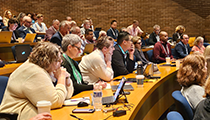Defying the Teeth of Time: Developing a Maintenance Mentality
By Wesley Brewer on February 24, 2022 music directors & adjudicators article PrintEarly in my career, a colleague who was an avid runner provided me with a photocopied writing called, “Why Do I Run?” by George Sheehan. I posted it in my classroom for students to see because the message was as pertinent to musicians as it was to athletes. Simple and profound, it stated that we practice, we run, we maintain, not always to move forward, but often just to stay where we are, to avoid falling behind. The progress we have achieved is much more easily lost than it is won. We must “run” just to stay in place or as Sheehan stated “to preserve the self I attained the day before.” It is the discipline required to maintain what we already have that is so important.
This reading referred to the writings of American philosopher Eric Hoffer, a self-taught scholar and profound thinker who was also a longshoreman. He wrote often about the necessities of maintenance for any great society. It was those societies who paid close attention to maintaining what was already built, already earned, that were most destined for success. This attitude is summarized well in a quote from his 1960’s newspaper column where he writes, “To me there is an aura of grandeur about the dull routine of maintenance: I see it as a defiance of the teeth of time. It is easier to build than to maintain. . . but the energy which goes into maintaining things in good repair day in, day out is the energy of true vigor” (Hoffer, 1969).
The simple photocopied reading that had been given to me started me down a path of thinking about how the concept of maintenance could apply in so many areas of life. It was not just my personal musicianship that needed maintenance. What other aspects of my work life and personal life could also benefit from a maintenance mentality? For me, this slowly developed over several years into a disposition and commitment to giving low grade attention to tasks and obligations on a regular basis rather than heroic efforts on an emergency basis.
Certainly, there were times when I had let things pile up. I knew that I was ignoring a task, and the more I ignored it, the more daunting it became. I could convince myself to continue with avoidance by telling myself the task would take time and energy I did not have to spare. But, this act of delaying had a doubly negative effect. Delaying meant I was not only falling short of my goals, I was also causing myself to experience guilt and anxiety. I would end up in a downward spiral of sorts, not accomplishing what I needed to and also feeling bad about it.
The recent popularity of the Netflix show “Tidying Up with Marie Kondo” gives us insight into how people can both struggle with and overcome these tendencies toward letting things pile up. To me, Marie Kondo’s approach is clearly based on a maintenance mentality. The process begins with identifying and prioritizing belongings and then creating organizational systems that ensure a place for everything (and that everything is returned to its place when not in use). This work is, at first, monumental, but the relief for those who engage in the process is palpable. The maintenance of order that follows is far simpler than the Herculean effort necessary to enact change.
This time of year (I am writing this as the school year is just beginning) is perfect to reflect on past successes and failures and develop new goals, habits, and routines. There is a natural cycle to school life after all and this is the academic New Year! I provide here a short list of possible areas in your professional life that could benefit from routine maintenance. The time you spend paying regular attention in short spurts might save you hours of time later as well as helping you squash the guilt, anxiety, and compounded problems that avoidance naturally creates.
Relationships with Parents
For many teachers, interactions with students’ parents revolve around problems. We only hear from parents and they only hear from us when there is a negative situation that needs attention. What can we do to increase contact and deepen our relationships with our students’ parents, to create trust and rapport before problems arise? How can we inform parents on a regular basis about what students are learning and achieving in our classes? For those lucky enough to have parents involved in booster organizations, how can we more clearly communicate and delegate tasks that do not need our professional expertise, freeing our time for those tasks only we can accomplish?
Relationships with Students
We are often absorbed with getting through the class period or rehearsal, or getting ready for the next event. How can we take time on a regular basis to connect with students on a personal level and give them the opportunity to connect with us? How can we involve them in the decision making processes that guide our work, collaborating rather than dictating? Maintenance in this area can naturally lend itself to better classroom behavior and to a more invigorating experience for all parties through a deeper sense of investment in classroom activities. What do we want to say to students that we have neglected saying? What do they want to say to us that we have not allowed to be heard? How can we share the responsibilities of teaching and learning together?
Relationships with Family
Work as a teacher can be all-consuming. When we are not teaching, we are grading, preparing, attending meetings, and organizing events. This never-ending stream of tasks and obligations has led many a teacher to change professions. It is often the important and irreplaceable relationships we have with our family members that suffer most, even though they are vital to keeping us sane! How can we ensure that these relationships stay fresh and healthy? How can we thank our family members, even in the smallest of ways, for the invaluable support they provide? How can we better use our calendars to prioritize and protect this time that is fundamental to a sustainable career?
Library and Inventory
The more fortunate we are to have the program resources we need, the more maintenance of inventory becomes an issue. Many of our colleagues would be envious to have the vast libraries of repertoire, books, and instruments that our idealized music programs hold, but the gift of these resources increases costs and responsibilities for maintenance. What systems can we develop that allow for easy tracking of these items? How can we ensure that instruments are being looked at on a regular basis to receive repairs and upkeep that will prevent larger (and more costly) problems from happening? What tips and tricks can we learn from experienced colleagues that will save time and space in storage facilities? How will recently-used materials find their way back to a dedicated place in a timely way? How can you involve students (and parents) in the maintenance of these systems?
Email: Inbox Zero
In the modern age, email has become a necessary evil for most professional educators. At times, it can be a wonderful tool for communication, but often it becomes a time-sucking distraction that keeps us from doing our best work and focusing on things that matter more. Dozens of articles outline management strategies for email more effectively than I can cover in this space, but if you have never considered the concept of “inbox zero,” it is worth investigating. It should be noted that experts do not all agree on whether inbox zero is effective or realistic, but many high-functioning professionals swear by it. In short, the “zero” part of the phrase does not refer to having an empty inbox (though that is an admirable goal), but rather to the amount of time that you spend in the inbox. The originator of the approach, Merlin Mann, outlined five simple actions for each message you receive: delete, delegate, respond, defer, and do. Some other important principles related to this approach involve not treating your inbox as a to-do list, not leaving your email inbox open all day, and disabling automatic notifications on your computer and phone. Instead of looking immediately at everything new coming in, set aside specific times to deal with the inbox, even just a few times a day. Mann also advocates the use of folder systems for archiving and managing messages so that they are not hanging out in the inbox and creating clutter. This type of solution may work in varying degrees for your situation; consider revisiting your systems for dealing with email and see what is possible.
Conclusion
In closing, developing a maintenance mentality can help us to improve the quality of our work and our life. Routines and habits are helpful when they are dynamic and productive. When things become routine in a bad way, we go on auto-pilot and neglect to notice the piling and cluttering that is happening ever so slowly, chewing away at our ability to be effective at home and at work. A maintenance mentality helps us to foreground our work and personal tasks and give them each the appropriate attention they deserve, no more and no less.
References
Hoffer, E. (1969, April 27). Endless war with nature. Yuma Sun, p. 4.
Sheehan, G. (n.d.). Why do I run?
Wesley Brewer
Wesley Brewer is the Associate Professor and Coordinator of Music Education at Oregon State University. This article first appeared in the Oregon Music Educators Journal, Fall edition. The Oregon Music Education Association provides programs and activities for professional educators, students and future music educators striving to enhance the quality of music education for all children. Check out the Oregon Music Education Association here: ( https://oregonmusic.org/ )
Most Recent Articles







